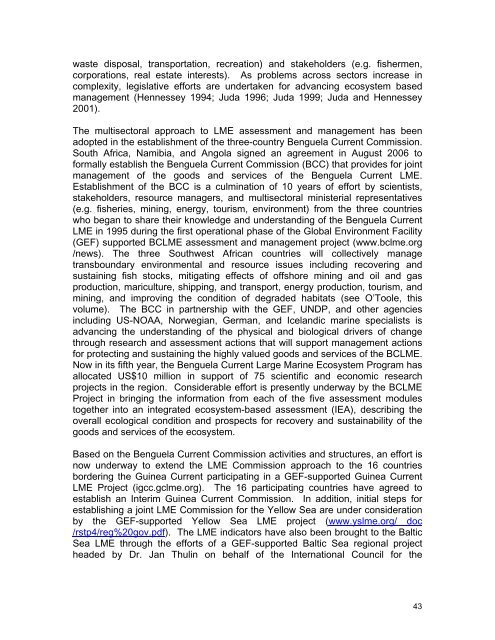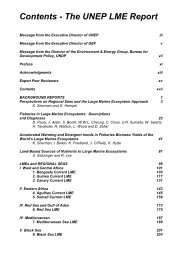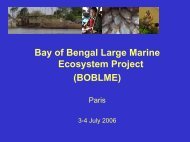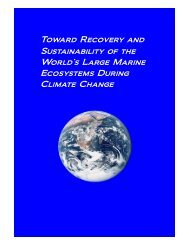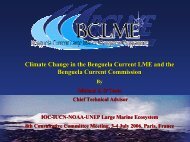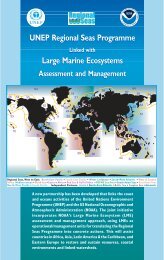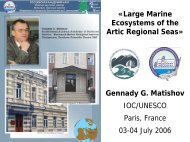Sustaining the World's Large Marine Ecosystems
Sustaining the World's Large Marine Ecosystems
Sustaining the World's Large Marine Ecosystems
You also want an ePaper? Increase the reach of your titles
YUMPU automatically turns print PDFs into web optimized ePapers that Google loves.
waste disposal, transportation, recreation) and stakeholders (e.g. fishermen,<br />
corporations, real estate interests). As problems across sectors increase in<br />
complexity, legislative efforts are undertaken for advancing ecosystem based<br />
management (Hennessey 1994; Juda 1996; Juda 1999; Juda and Hennessey<br />
2001).<br />
The multisectoral approach to LME assessment and management has been<br />
adopted in <strong>the</strong> establishment of <strong>the</strong> three-country Benguela Current Commission.<br />
South Africa, Namibia, and Angola signed an agreement in August 2006 to<br />
formally establish <strong>the</strong> Benguela Current Commission (BCC) that provides for joint<br />
management of <strong>the</strong> goods and services of <strong>the</strong> Benguela Current LME.<br />
Establishment of <strong>the</strong> BCC is a culmination of 10 years of effort by scientists,<br />
stakeholders, resource managers, and multisectoral ministerial representatives<br />
(e.g. fisheries, mining, energy, tourism, environment) from <strong>the</strong> three countries<br />
who began to share <strong>the</strong>ir knowledge and understanding of <strong>the</strong> Benguela Current<br />
LME in 1995 during <strong>the</strong> first operational phase of <strong>the</strong> Global Environment Facility<br />
(GEF) supported BCLME assessment and management project (www.bclme.org<br />
/news). The three Southwest African countries will collectively manage<br />
transboundary environmental and resource issues including recovering and<br />
sustaining fish stocks, mitigating effects of offshore mining and oil and gas<br />
production, mariculture, shipping, and transport, energy production, tourism, and<br />
mining, and improving <strong>the</strong> condition of degraded habitats (see O’Toole, this<br />
volume). The BCC in partnership with <strong>the</strong> GEF, UNDP, and o<strong>the</strong>r agencies<br />
including US-NOAA, Norwegian, German, and Icelandic marine specialists is<br />
advancing <strong>the</strong> understanding of <strong>the</strong> physical and biological drivers of change<br />
through research and assessment actions that will support management actions<br />
for protecting and sustaining <strong>the</strong> highly valued goods and services of <strong>the</strong> BCLME.<br />
Now in its fifth year, <strong>the</strong> Benguela Current <strong>Large</strong> <strong>Marine</strong> Ecosystem Program has<br />
allocated US$10 million in support of 75 scientific and economic research<br />
projects in <strong>the</strong> region. Considerable effort is presently underway by <strong>the</strong> BCLME<br />
Project in bringing <strong>the</strong> information from each of <strong>the</strong> five assessment modules<br />
toge<strong>the</strong>r into an integrated ecosystem-based assessment (IEA), describing <strong>the</strong><br />
overall ecological condition and prospects for recovery and sustainability of <strong>the</strong><br />
goods and services of <strong>the</strong> ecosystem.<br />
Based on <strong>the</strong> Benguela Current Commission activities and structures, an effort is<br />
now underway to extend <strong>the</strong> LME Commission approach to <strong>the</strong> 16 countries<br />
bordering <strong>the</strong> Guinea Current participating in a GEF-supported Guinea Current<br />
LME Project (igcc.gclme.org). The 16 participating countries have agreed to<br />
establish an Interim Guinea Current Commission. In addition, initial steps for<br />
establishing a joint LME Commission for <strong>the</strong> Yellow Sea are under consideration<br />
by <strong>the</strong> GEF-supported Yellow Sea LME project (www.yslme.org/ doc<br />
/rstp4/reg%20gov.pdf). The LME indicators have also been brought to <strong>the</strong> Baltic<br />
Sea LME through <strong>the</strong> efforts of a GEF-supported Baltic Sea regional project<br />
headed by Dr. Jan Thulin on behalf of <strong>the</strong> International Council for <strong>the</strong><br />
43


